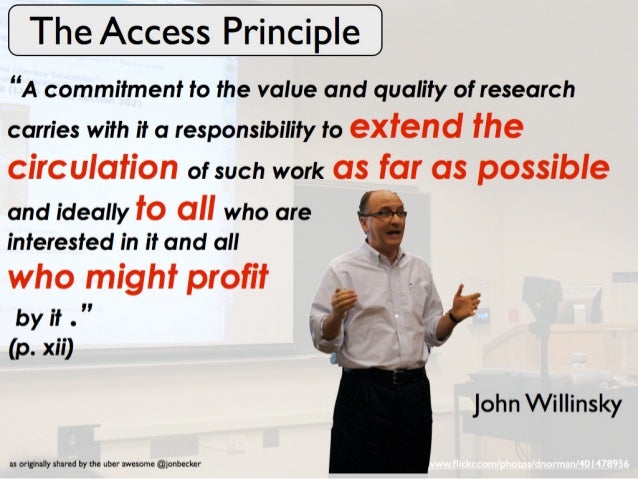Cross posted at the Huffington Post
John Spencer is quickly becoming one of my favourite reads. He’s clever, succinct and more importantly works with kids everyday. His recent post about why he doesn’t believe in research comes to me after experiencing a few issues around research of late.
Much of my own feelings about research are a result of reading a lot of Dave Weinberger’s writings. Weinberger talks about the changing shape of knowledge and that network knowledge is negotiated as opposed to traditional knowledge which was more accepted. Print and books are designed to contain and be the final word on truth. You don’t ask questions to paper. Now with work being online, our reaction is always to want to have a discussion around ideas. Of course this is extremely liberating both also problematic when everything is questioned and conversations involved many perspectives. Welcome to democracy.
While preparing for an upcoming presentation I came across a slide I’ve used citing that our brain processes images 60,000 times faster than text. Sounds impressive and useful for convincing folks to use more images to help understanding. The problem is the research, as far as many can tell is not true. Darren and Alan have done great work in trying to find the source but have had no luck. So given that research is not valid what do I do? I don’t need research to tell me that I learn better when visuals are involved. Some visuals are better than others but in trying to craft a message I know the impact a powerful image has on my recall ability. I could pull up some other research but in the end, if I use John’s questions in his post, I may not find it that valuable.
Yesterday my wife was feeling a bit stressed over a parent who has been emailing her because she’s concerned about the lack of homework, the fact she doesn’t use spelling tests or use paper agendas. These are clearly hot button issues that many feel strongly about one way or another. I tried to track down a bit of research to support her and while I found some that did, I found others that did not. Of course we know as John says, that research can be used to support almost any notion. Which is why for me, the real important research is the reflective teacher. I’ve been talking for an awful long time about the importance, the significance of teachers who blog. I’ve not talked about it specifically from a research perspective but to me the writing that someone does that analyzes and assesses their practice is every bit as valuable as the university studies that follow all the fancy research rules. When working with the dynamics of children, research often leads us to focus on simple solutions. We want to distil and synthesize complex studies down to something manageable and usable. “Give kids homework”. “Don’t give homework.” Do you see how narrow and simplistic those stances are?
Like grading and assessment, many are looking for simple, clean answers that if possible fit in a scale between 1-100. But like parenting, the education of a child is anything but simple and clean. That doesn’t mean research is useless but it does mean that we’ll all continue to use it to serve our purposes and perhaps that’s okay. What’s not okay is to suggest that your findings are definitive and that personal experiences as educators are less important. Again, that’s why I urge teachers to become researchers themselves. I believe they all are involved in action research everyday, trying to move closer to understanding how kids learn. What I need them to do is to share their experiences and describe their own practices. I’ve been saying this a lot to people lately but I try to “describe” not “prescribe” ideas for teachers. There are some things we all agree upon. Among them:
- reading to kids is good
- writing a lot makes you a better writer
- we learn best by doing
- exercise helps improve learning
I don’t need research to help me support these ideas. I will pick and choose research that support my own beliefs. And by research I mean blog posts and experiences of other teachers. What I won’t do is tell everyone they have to do likewise. I’ll use that research to ask others to consider a new approach, then wait for them to respond. That’s exactly what happened as I described something I was doing with my students around assessment. While I’m building loosely off of research, the real research comes with my practice. I tried it, shared my experiences and invited others to see if it would work. Bill tried it and documented his experience. That’s action research, research that’s valuable and meaningful.
So my advice is not to suggest formal educational studies and research isn’t valuable. But it’s real value comes practitioners see themselves as researchers, test the theories and share the results in these negotiable, network spaces where conversations and professional dialog provide value not only to yourself but to others.
